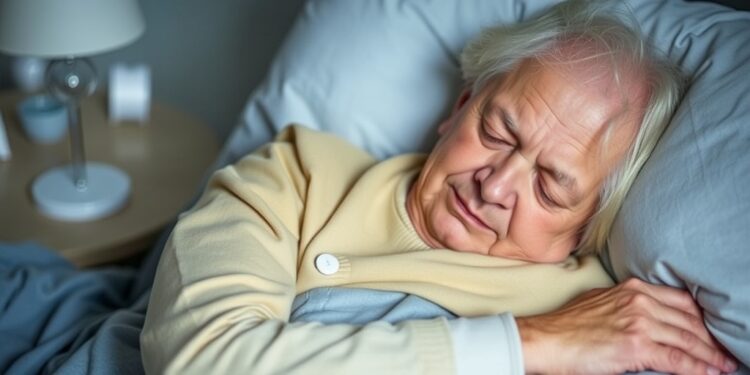MINNEAPOLIS — Recent research has indicated a significant correlation between increasing daytime sleepiness in elderly women and an elevated risk of developing dementia. The study, conducted over a five-year period and published in the prestigious medical journal Neurology® on March 19, 2025, sheds light on how sleep patterns can serve as potential indicators of cognitive decline. While the findings emphasize an association rather than a causative relationship between sleepiness and dementia, they open avenues for further inquiries into the nature of cognitive aging and sleep.
According to study author Dr. Yue Leng from the University of California, San Francisco, sleep functions as a critical component of cognitive health. During sleep, the brain effectively rejuvenates, which in turn enhances cognitive functions such as memory and clarity of thought. Yet, the relationship between sleep disturbances and cognitive deterioration remains underexplored, particularly in the context of aging populations. This study aims to illuminate those connections as they pertain to older women.
The research involved a cohort of 733 women, all averaging around 83 years of age, selected primarily because they did not exhibit mild cognitive impairment or dementia at the study’s outset. The longitudinal design of the research allowed for an examination of how changes in sleep patterns impacted cognitive function over time. The findings are crucial for understanding how sleep-related challenges might indicate a vulnerability to dementia in later life stages.
Throughout the follow-up period, participants actively wore wrist devices that meticulously tracked their sleep patterns and circadian rhythms over three-day intervals at both the beginning and end of the study. Such objective measurements enabled researchers to draw nuanced conclusions about shifts in participants’ sleeping behaviors, an increasingly pertinent aspect of understanding neurological health.
Analyses from this investigation revealed notable changes in sleep patterns for more than half of the participants during the study’s duration. The findings categorized the participants into three distinct groups: a stable sleep group representing 44% of women, a declining nighttime sleep group comprising 35%, and an increasing sleepiness group, which accounted for 21% of subjects. Each group presented unique profiles in terms of their sleep quality and duration, as well as their napping and circadian rhythm characteristics.
Diving deeper into the implications of these changes, researchers sought to comprehend how they related to dementia risk. When comparing the incidence of dementia among the groups, the results were striking. Those who had stable sleep patterns exhibited the lowest rates of dementia, with only 8% of this cohort developing the condition. In contrast, 15% of women in the declining nighttime sleep group developed dementia, while the increasing sleepiness group faced an alarmingly elevated risk, with 19% experiencing dementia.
Factors such as age, education, race, and health variables including diabetes and hypertension were carefully controlled in the analysis. Remarkably, findings revealed that participants who experienced increasing daytime sleepiness were found to have double the risk of developing dementia compared to their counterparts in the stable sleep group. Interestingly, the declining nighttime sleep category did not show a significant correlation with increased dementia risk, suggesting a unique susceptibility linked specifically to heightened daytime sleepiness.
Dr. Leng highlighted the variability in sleep patterns observed over a relatively short time frame for women in their 80s, emphasizing the crucial role that sleep, napping behaviors, and circadian circadian rhythms play in cognitive health. The research underscores the need for comprehensive studies investigating all dimensions of sleep behavior and how these shifts over time can relate to cognitive decline risks, specifically in older women.
While the study advanced understanding of the relationship between sleep and cognitive health, a noted limitation was its demographic composition, which predominantly included white participants. Therefore, the generalizability of the findings is limited concerning more diverse populations, indicating a need for expanded research that encompasses varying ethnicities and backgrounds.
Funded by the National Institutes of Health and the National Institute on Aging, this research is a commendable step in addressing the significant intersection of sleep quality and cognitive health in aging females. Future inquiries should not only seek to validate these findings across more diverse populations but also aim to elucidate the mechanisms through which sleep patterns affect cognitive outcomes.
In summary, the connection between increasing daytime sleepiness and dementia risk in older women confirms the complex interplay of sleep and cognitive health. These findings encourage proactive approaches not only in monitoring sleep patterns among the elderly but also in developing interventions that may buffer against cognitive decline rooted in sleep disturbances—a crucial consideration for enhancing quality of life as one ages.
Discover comprehensive resources on dementia and brain health through platforms powered by the American Academy of Neurology. Their commitment to providing trusted information can empower individuals, caregivers, and healthcare professionals alike in navigating the complexities of neurological health.
With scientific insights continually evolving, understanding the intricate layers of brain health can lead to more effective preventative strategies. As aging populations grow worldwide, research like this serves as a beacon, illuminating pathways toward better cognitive health outcomes facilitated through sleep management and insight-driven interventions.
Subject of Research: The association between daytime sleepiness and dementia risk in women aged 80 and above.
Article Title: Increased Daytime Sleepiness Linked to Higher Dementia Risk in Elderly Women
News Publication Date: March 19, 2025
Web References: Neurology, American Academy of Neurology
References: National Institutes of Health, National Institute on Aging
Image Credits: American Academy of Neurology
Keywords: Sleep, Dementia, Risk factors, Cognitive development, Public health.
Tags: aging populations and sleep disturbancescognitive decline in elderly womencognitive functions and sleepcorrelation between sleep and memorydaytime sleepiness and dementia riskDr. Yue Leng research findingselderly women sleep studieslongitudinal study on cognitive agingNeurology journal dementia researchpotential indicators of dementiarejuvenation of the brain during sleepsleep patterns and cognitive health





